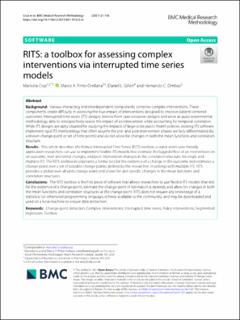RITS: a toolbox for assessing complex interventions via interrupted time series models
Peer reviewed, Journal article
Published version
Permanent lenke
https://hdl.handle.net/11250/3009697Utgivelsesdato
2021-07-08Metadata
Vis full innførselSamlinger
Originalversjon
BMC Medical Research Methodology. 2021, 21 (1), . https://doi.org/10.1186/s12874-021-01322-wSammendrag
Background: Various interacting and interdependent components comprise complex interventions. These components create difficulty in assessing the true impact of interventions designed to improve patient-centered outcomes. Interrupted time series (ITS) designs borrow from case-crossover designs and serve as quasi-experimental methodology able to retrospectively assess the impact of an intervention while accounting for temporal correlation. While ITS designs are aptly situated for studying the impacts of large-scale public health policies, existing ITS software implement rigid ITS methodology that often assume the pre- and post-intervention phases are fully differentiated (by a known change-point or set of time points) and do not allow for changes in both the mean functions and correlation structure. Results: This article describes the Robust Interrupted Time Series (RITS) toolbox, a stand-alone user-friendly application researchers can use to implement flexible ITS models that estimate the lagged effect of an intervention on an outcome, level and trend changes, and post-intervention changes in the correlation structure, for single and multiple ITS. The RITS toolbox incorporates a formal test for the existence of a change in the outcome and estimates a change-point over a set of possible change-points defined by the researcher. In settings with multiple ITS, RITS provides a global over-all units change-point and allows for unit-specific changes in the mean functions and correlation structures. Conclusions: The RITS toolbox is the first piece of software that allows researchers to use flexible ITS models that test for the existence of a change-point, estimate the change-point (if estimation is desired), and allow for changes in both the mean functions and correlation structures at the change point. RITS does not require any knowledge of a statistical (or otherwise) programming language, is freely available to the community, and may be downloaded and used on a local machine to ensure data protection. Keywords: Change-point detection, Complex interventions, Interrupted time series, Policy interventions, Segmented regression, Toolbox

